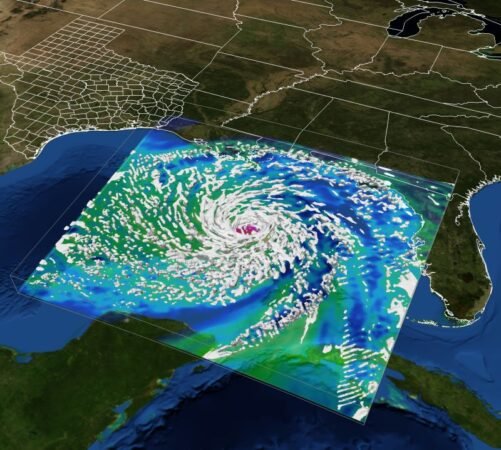Summary Points
-
Hurricane Risk Calculator: NCAR’s new web app aims to forecast structural damage from hurricanes, enabling tailored evacuation orders based on specific addresses rather than broader zones.
-
Enhanced Research Facilities: NSF-backed experimental infrastructures, such as NHERI, aid in improving hurricane predictions and designing resilient building codes to better withstand storm impacts.
-
Community Response and Decision-Making: Understanding how cultural backgrounds and past experiences affect public response to hurricane warnings is crucial for effective communication and preparedness.
- Long-term Impact Studies: NSF’s research initiatives explore the ecological and socioeconomic effects of hurricanes, emphasizing the need for a comprehensive understanding of disaster impacts on communities.
Hurricanes pose a persistent threat to coastal communities. As we approach another hurricane season, preparation becomes essential. The National Science Foundation (NSF) plays a pivotal role in enhancing community resilience through innovative research. Programs like the Hurricane Risk Calculator web app demonstrate this commitment.
Researchers at the National Center for Atmospheric Research (NCAR) developed the Hurricane Risk Calculator to provide tailored forecasts of potential structural damage. By inputting details about their homes, users contribute to improving the tool’s accuracy. This approach allows local officials to make informed evacuation decisions based on individual addresses rather than broader zones. Such precision could save lives.
Moreover, NSF supports vital infrastructure for hurricane research. Facilities like the Natural Hazards Engineering Research Infrastructure (NHERI) allow scientists to study building designs and storm impacts. For instance, the Wall of Wind Experimental Facility at Florida International University simulates the winds of a Category 5 hurricane. This data informs engineers on enhancing building resilience.
In addition, tools like the Hybrid WRF Cyclone Model enable researchers to predict hurricane tracks and impacts with greater accuracy. For example, this model can simulate how a storm might evolve, simulating different scenarios for effective preparation. Such advancements lead to more reliable warnings and improved community responses.
However, understanding how people react to storm information remains crucial. The Weather Risks and Decisions in Societies (WRaDS) program explores the societal aspects of hurricane preparedness. It recognizes that individuals interpret risk differently, affected by cultural backgrounds and previous experiences. Effective communication of risks—among scientists, officials, and media—improves the likelihood that people will heed evacuation orders.
NSF’s collaborations extend to the Civic Innovation Challenge, focusing on enhancing community resilience. This includes addressing food distribution in disasters and supporting low-income households post-storm. These initiatives ensure that preparedness is equitable and inclusive.
Hurricanes influence not only buildings but also ecosystems and economies. NSF’s research spans multiple disciplines to provide a comprehensive understanding of these impacts. For instance, studies show that lower-income households face disproportionate economic challenges during hurricanes. By examining these disparities, researchers can inform better policies to support affected communities.
Preparing for hurricanes is not just about science; it’s about people. Tools and research from NSF empower communities to act wisely and decisively in the face of threats. As hurricane season approaches, it is vital to embrace these resources. Preparedness starts with awareness and understanding. Everyone has a role to play in mitigating the impact of these natural disasters. Resources from NOAA and NSF can guide individuals and communities toward safer outcomes this season.
Continue Your Tech Journey
Learn how the Internet of Things (IoT) is transforming everyday life.
Stay inspired by the vast knowledge available on Wikipedia.
TechV1

